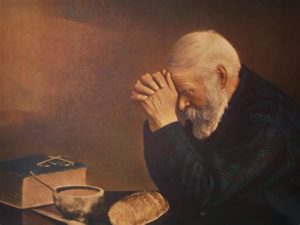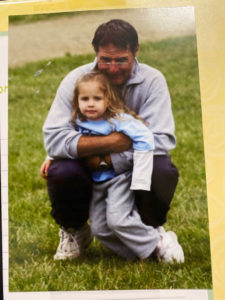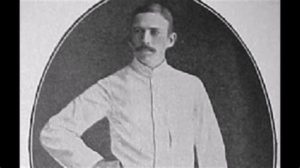 My last post was regarding the National Day of Prayer. There are innumerable articles on the history of this day and how it has reached its present position on our federal calendar, so I thought it would be a good exercise to read some of those and brush up on my history a bit. Unfortunately, I made the mistake of reading some of the comments people left after the articles. Here is my conclusion. It is okay to read good spiritual articles, but if we want our blood pressure to stay stable, we should avoid the rants that come after the articles. Finding meaningful, enlightening, and mature interchanges on the internet is more than a challenge, it is nearly impossible.
My last post was regarding the National Day of Prayer. There are innumerable articles on the history of this day and how it has reached its present position on our federal calendar, so I thought it would be a good exercise to read some of those and brush up on my history a bit. Unfortunately, I made the mistake of reading some of the comments people left after the articles. Here is my conclusion. It is okay to read good spiritual articles, but if we want our blood pressure to stay stable, we should avoid the rants that come after the articles. Finding meaningful, enlightening, and mature interchanges on the internet is more than a challenge, it is nearly impossible.
Christians should pray everyday but not fall prey to hateful comments following legitimate articles on spiritual matters. By now we should realize there are certain people out there that surf the web for Christian blogs and articles, just so they can post hateful and often crude comments. In fact, they purposely look for spiritual articles so they can demonstrate their uncanny command of profanity. Unfortunately, “Christian” responses are often just as grating. I cringe when read some of the emotional negativity that is exchanged between believers and non-believers in the comment sections around the net. Sadly, it is often hard to tell them apart. I seldom read the comments after  an article or video any more because the comments never change- the articles do, but the comments don’t.
an article or video any more because the comments never change- the articles do, but the comments don’t.
I have often heard (and even said) that we cannot argue someone into heaven. I have also often heard (and even said) that we cannot love someone into heaven. So what can we do to reach the multitudes that look at Christianity as superstition and fantasy? Well, I know there are a couple of things that have not worked and will not work. We cannot name call or bully someone into a relationship with God. If that were the case, everyone would be turning to Allah right about now. No, I have concluded that people who hate god are not too fond of Christians either, so berating non-believers, talking down to them, and trying to out-name-call them is useless. It gives them the fodder they need to continue  the feelings they already have. There has to be a better way.
the feelings they already have. There has to be a better way.
Years ago I heard a story of a little boy who was complaining that his brother was making faces at him. The father asked him how he knew that because his brother was in his own room.  “I am looking through the keyhole,” the little boy replied. Often that little boy is us. We look through the keyhole at comments that we know are going to be hateful, we get frustrated, we say things we shouldn’t, in ways we wish we hadn’t, and then these comments live forever, floating around in cyberspace. I have come across comments that are twenty years old on some sites. Is it possible that these people have changed a bit in a couple of decades? Many comments are like bad photos from the past which pop up embarrassingly every few months, haunting the photoed and reminding them that a mistake is never forgotten in the cyber world.
“I am looking through the keyhole,” the little boy replied. Often that little boy is us. We look through the keyhole at comments that we know are going to be hateful, we get frustrated, we say things we shouldn’t, in ways we wish we hadn’t, and then these comments live forever, floating around in cyberspace. I have come across comments that are twenty years old on some sites. Is it possible that these people have changed a bit in a couple of decades? Many comments are like bad photos from the past which pop up embarrassingly every few months, haunting the photoed and reminding them that a mistake is never forgotten in the cyber world.
So how should we react to those who ridicule God and even those who supposedly support Him but in unacceptable ways? First of all, we need to come to the realization that God wants all to come to a saving knowledge of Him. First Timothy 2:4 says that God “…desires all people to be saved and to come to the knowledge of the truth.” Yes, God even wants to save that angry blogger who just called you a “superstitious fool with the brains of a child and the sense of a mule.”  I have read with amusement as someone tries to get the upper hand on some of these atheist snipers. It is useless. They are very, very seldom receptive to any words from the Word. God tells us the problem in Proverbs, “The fear of the Lord is the beginning of knowledge; fools despise wisdom and instruction.” (Proverbs 1:7) Trying to argue most people out of their long-held beliefs is almost as futile as an Amish man trying to talk gang members into dropping their weapons. It might happen, but only by the power of the Holy Spirit, not by the power of words.
I have read with amusement as someone tries to get the upper hand on some of these atheist snipers. It is useless. They are very, very seldom receptive to any words from the Word. God tells us the problem in Proverbs, “The fear of the Lord is the beginning of knowledge; fools despise wisdom and instruction.” (Proverbs 1:7) Trying to argue most people out of their long-held beliefs is almost as futile as an Amish man trying to talk gang members into dropping their weapons. It might happen, but only by the power of the Holy Spirit, not by the power of words.
We believe what we believe, not because we were forced there, but because the Holy Spirit revealed a void then offered to fill it. CS Lewis had it right when he said, “I believe in Christianity as I believe that the sun his risen: not only because I see it, but by it I see everything else.” Once we have Christ, we often have a hard time understanding why others are so stubborn (as though we have never been stubborn). We hang on to the far-fetched idea that if we can demolish the opponent with arguments, maybe a few well-placed zingers, and a humbling phrase or two and they will roll over in the fetal position and ask to know how they can know Jesus. That isn’t going to happen.
Will responding to hate with hate change Andy the Atheist to Samuel the Saint? I doubt it. Don’t get me wrong. Peter tells us to “…honor the Messiah as Lord in (our) hearts. Always be ready to give a defense to anyone who asks (us) for a reason for the hope that is in (us).” (1 Peter 3:15) But there are ways to give a defense and ways not to. There is a great scene from one of my favorite movies,  Sandlot, where two groups of boys are standing around exchanging insults. The insults don’t bring about a conclusion, they still have to play a ball game to settle things. In Shakespeare’s Julius Caesar, Mark Anthony and Brutus meet on the battlefield to throw barbs back and forth (similar to the exchange in Sandlot), but they settle nothing and still meet on the battlefield to “work things out.” That is the thing about insults. They tend to be insulting. Thus, they seldom are effective.
Sandlot, where two groups of boys are standing around exchanging insults. The insults don’t bring about a conclusion, they still have to play a ball game to settle things. In Shakespeare’s Julius Caesar, Mark Anthony and Brutus meet on the battlefield to throw barbs back and forth (similar to the exchange in Sandlot), but they settle nothing and still meet on the battlefield to “work things out.” That is the thing about insults. They tend to be insulting. Thus, they seldom are effective.
I once saw a cartoon that showed a man on horseback holding a large shield with a cross on it. He had his lance at the throat of a man lying flat on his back on the ground. The man on the ground was saying, “Okay, let’s talk about this god of yours.” I have a hard time believing that spiritual decisions made at the tip of a spear are usually heartfelt.
 Awhile back I read a young reader book about the end times that is pretty interesting. It is entitled “Scars” and many people in the book are forced to choose between denouncing Christ or facing death. It is fiction, but unfortunately that same decision is being faced by hundreds everyday across our globe. Not that long ago 21 Christians were beheaded for their faith. A witness to the event said that each of them declared, “Jesus is Lord,” before the blade did its job. Faith cannot be coerced. It is either real or it is not.
Awhile back I read a young reader book about the end times that is pretty interesting. It is entitled “Scars” and many people in the book are forced to choose between denouncing Christ or facing death. It is fiction, but unfortunately that same decision is being faced by hundreds everyday across our globe. Not that long ago 21 Christians were beheaded for their faith. A witness to the event said that each of them declared, “Jesus is Lord,” before the blade did its job. Faith cannot be coerced. It is either real or it is not.
When we celebrate the National Day of Prayer it gives us the key to changing hearts. We need to pray! Our only chance to really change someone is the same way we were changed. Someone interceded for us. Paul tells us in Ephesians 6:12 that, “…we do not wrestle against flesh and blood, but against the rulers, against the authorities, against the cosmic powers over this present darkness, again st the spiritual forces of evil in the heavenly places.” These kinds of opponents aren’t dissuaded with insults. So the next time we are reading a blog by a basher or an assault from an attacker maybe we should ask if we have a reasoned response that might really make him think. Instead of putting pen to paper with pathetic pejoratives, we should prayerfully petition for the person’s position in Christ. (Wow, alliteration gone wild). In other words, our words to “him on our behalf” will probably have less power than our words to “Him on his behalf.”
st the spiritual forces of evil in the heavenly places.” These kinds of opponents aren’t dissuaded with insults. So the next time we are reading a blog by a basher or an assault from an attacker maybe we should ask if we have a reasoned response that might really make him think. Instead of putting pen to paper with pathetic pejoratives, we should prayerfully petition for the person’s position in Christ. (Wow, alliteration gone wild). In other words, our words to “him on our behalf” will probably have less power than our words to “Him on his behalf.”
Recently I heard an apologist say that his desire is not to change someone (only the Holy Spirit can do that), but to put a stone in his shoe. We should present the Lord in such a way that others will be reminded of Him as they go through their day. I like that analogy. If we put an interest of God in someone’s mind (and don’t chase him away with harsh words), they will be “bugged” by those truths. Hopefully, they will want to investigate “the Solid Rock” someday.
 A nation observing prayer is good, but observing prayer every day is better. We can do so much more for the people around us, our country, and this world with prayer than with any other efforts. Arguing is fruitless, debate is okay, but prayer is the only thing that can really change others. So often when people argue and someone does get a last word in, it is really the first part of a new argument. It is a never-ending cycle of give and take that has a lot more take than give.
A nation observing prayer is good, but observing prayer every day is better. We can do so much more for the people around us, our country, and this world with prayer than with any other efforts. Arguing is fruitless, debate is okay, but prayer is the only thing that can really change others. So often when people argue and someone does get a last word in, it is really the first part of a new argument. It is a never-ending cycle of give and take that has a lot more take than give.
So the next time we feel inclined to bury a bully under a barrage of insults, we should instead intervene for him in prayer. Exodus 23:5 says, “If you see the donkey of someone who hates you fallen down under  its load, do not leave it there; be sure you help them with it.” When we see someone full of hate and disregard for others, the only thing that can change him is prayer. The above verse is basically saying that if someone has burdens in his life, we are to help him. It is not helping to pile more burdens on him.
its load, do not leave it there; be sure you help them with it.” When we see someone full of hate and disregard for others, the only thing that can change him is prayer. The above verse is basically saying that if someone has burdens in his life, we are to help him. It is not helping to pile more burdens on him.
We need to remember Jesus’ words in Matthew, “For my yoke is easy and my burden is light.“ (Matthew 11:30). Our prayers to lessen another’s burdens will go much farther than standing toe-to-toe and exchanging insults. Insulting exchanges make for good stories and plays, but are not very effective for moving someone from death into life. We should save our arguing for something far less important than eternal life. Vitriol will never lead to victory.




























